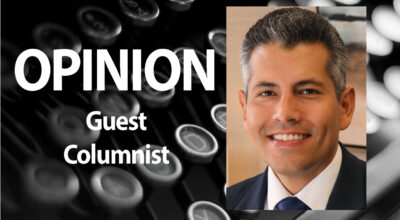Upside Down: Cartel boss sues government over harm from free enterprise
Published 6:51 am Saturday, October 28, 2017
by Mary Lou Serafine
If members of the public did not already know what a racket many professional associations are, they certainly should find out from a Texas lawsuit called Grothues v. Texas State Board of Examiners of Psychologists. Professional associations—once limited to physicians and surgeons, engineers, the few “learned” professions—commonly have used their lobbying clout to induce legislatures to create licensing boards charged with regulating the profession itself.
In reality of course, the professions controlled the boards, not vice versa, who acted not in the public interest but in the interest of the professional associations. Mainly the boards accomplished this by keeping out competition (limiting the number of licensees), price-fixing, and reducing advertising that would have educated consumers about their options.
In short, the professions, and the boards who were supposed to regulate them, worked hand-in-glove against the consumer. This is called “regulatory capture”—when the profession gains control of the board and uses the power of government to keep out competition and defeat free enterprise. The term “cartel” equally describes this.
Over time, of course, every occupation wanted its own licensing board, with the advantages of a cartel. Today barbers, hairdressers, funeral directors, interior designers, and psychologists plus counselors, social workers, and therapists, have captured their respective boards, to the disadvantage of the public.
Most people can’t see the cartel effect, the higher prices and limited choices.
Almost never do the professions and boards clash, because the former control the latter.
All of this changed in 2015 when the U.S. Supreme Court decided North Carolina State Board of Dental Examiners v. FTC. In that case the Court decided that in some cases professional associations and their boards were engaged in anti-competitive or anti-trust conduct.
In the typical anti-trust law suit, the injured party who is shut out from doing business, or who has to pay higher prices for fewer choices, sues the price-fixers, monopolizers, or cartels for curbing free enterprise. The point is that anti-competition and anti-trust violations are considered a bad thing. Free enterprise is a good thing.
But in an upside-down law suit that can only be called suing-to-protect-the-cartel, Dr. Carol Grothues filed her suit against the Texas psychology board for proposing that masters-degreed psychologists could practice psychology. This, Dr. Grothues complains, “will create a flood of new ‘psychologists’” and insurance companies “can then reimburse at lower rates.”
Yes, that’s right, the complaint is that the consumer will be able to pay lower prices or lower insurance premiums than they do now, because the cartel effect will have been broken, she complains.
In language that would be humorous if it weren’t serious, Dr. Grothues’ law suit warns that with this increase in free enterprise, doctoral psychologists “will have greater barriers to entry.” That phrase usually describes the victims of monopolies, not the monopolizers.
Dr. Grothues’ suit demands that the psychology board jump through procedural hoops such as conducting a “micro-business impact analysis.” But the suit ignores that masters-level psychologists are also micro-businesses, and they have been burdened for decades by the barriers to entry that Dr. Grothues and her colleagues created.
In the past, Texas, like other states, required masters-degreed psychologists to be “supervised” by doctoral-degreed psychologists. In substance, the masters-level person pays part of their earnings to the doctoral person for this “supervision,” often just cursory conversations. A santized pizzo, a modern-day protection fee, is what this really is.
Now the psychology board has proposed a rule to stop the pizzo, or at least limit it, and that is what Dr. Grothues has filed suit over.
But the majority of therapists, counselors, and social workers are trained only to the masters level, and they do very well for their clients. Research has shown that masters-trained professionals achieve beneficial outcomes with talk therapy that are not significantly different than those achieved by therapists with doctorates, even medical doctorates. And many clients prefer coaching, self-help groups, online or “book therapy,” and other methods when they navigate life.
Dr. Grothues is the president of the Texas Psychological Association. Her letter to the members of that private group on its website refers to “our state board” and “our state agency”—the defendant she’s suing—with a tone of ownership.
Dr. Grothues’ law suit is misguided because of the Carolina dental case. She is using the weight of her role as president of the TPA to influence the Board to increase rather than decrease any anti-competitive conduct. This can’t end well for the cartel, especially in the court of public opinion.
Mary Lou Serafine is the Austin attorney who brought the Serafine v. Branaman case, challenging the Texas Psychologists’ Licensing Act as an infringement of freedom of speech. Serafine ran for Texas Senate in 2010. She sued the Texas psychology board after it required her to change campaign materials in which she called herself “an Austin attorney and psychologist.” She had taught psychology and published research papers in psychology, but was not licensed to practice in Texas. She prevailed at the Fifth Circuit Court of Appeals.





